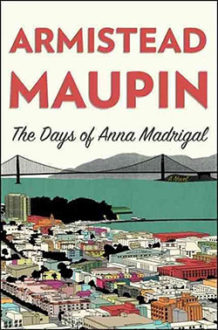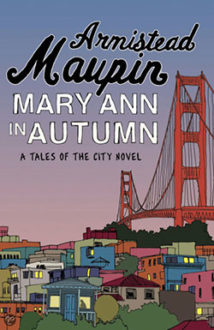 The Days of Anna Madrigal
The Days of Anna Madrigal
by Armistead Maupin
Published by Harper
Published January 21, 2014
Fiction
288 pgs. • Find on Amazon.com • WorldCat
Reviewed by Stephen O. Murray
January 21, 2014.
Writer Ameristead Maupin (born in DC in 1944) remains a San Francisco institution, despite his move last summer to the outskirts of Santa Fe, New Mexico [since then, he has returned, living in Diamond Heights, above the Castro].
What began as a newspaper serial (in the Marin Sun, then in the San Francisco Chronicle, then a year in the San Francisco Examiner), Tales of the City has run to nine volumes and been adapted to screen and stage (not the usual order that!). He has announced that the just-published Days of Anna Madrigal is the last one, though we heard this before—with the 1989 Sure of You. Maupin returned with the 2007 Michael Tolliver Lives, a title that was good news for fans of the series, many of whom thought that the HIV-positive Michael/”Mouse” would not have survived long enough to be saved by the “protease-inhibitor revolution” (1996).
The beloved transsexual “Mrs.” Madrigal is also alive and cogent at the age of 92, returning to Winnemucca, Nevada (a place of legal prostitution) and revisiting her childhood as a boy named Alex.
At a bookstore appearance at the Book Crossing in the San Francisco Ferry Building, Maupin was asked if he knew from the start that Anna Madrigal had changed sex. That biographical matter was not revealed until the series had run a year (and Mrs. Madrigal was loved by many readers, as by her tenants on Barbary Lane). Maupin said yes, though he also said that he did not know where many episodes were going to go as his deadline loomed.
 On the other hand, he had not realized that “Anna Madrigal” was an anagram for “a man and a girl” until a reader wrote him, having figured that “clue” out. (He was happy to accept this and uses it in Days of Anna Madrigal.)
On the other hand, he had not realized that “Anna Madrigal” was an anagram for “a man and a girl” until a reader wrote him, having figured that “clue” out. (He was happy to accept this and uses it in Days of Anna Madrigal.)
He said that the Internet made it easy to find information for the historical part of the book, including a 1936 menu of client services for a brothel, with the mysterious “dry bob” being the cheapest. (He said he worked it into the book without knowing what it referred to.) In answer to a question, he assured the audience that diluted Lysol was used as a spermicide back then.
I had arrived 40 minutes early, just in time to see the last seat occupied. I was joined on the cold cement floor next to the door to the outside by a woman who in the Q&A claimed seniority for familiarity with Maupin’s writing. She (Rebecca, if I remember correctly) had been his copy editor on the Chronicle. She said that he produced clean copy and that, moreover, she was not permitted (by the section editor) to change anything, even to supply a “He said” in a passage in which she lost who was speaking.
Her claim was trumped by another woman who worked with Maupin for the San Francisco Opera during the reign (approaching a reign of terror for employees) of Kurt Herbert Adler. Maupin recalled a meeting about casting for future productions in which Adler said he would not knowingly employ a homosexual. Maupin said that he gulped and uncrossed his legs.
Although Days of Anna Madrigal has the Golden Gate Bridge on its cover, most of it is set in Nevada—a Burning Man Festival as well as the return of Mrs. Madrigal to Winnemucca. Someone asked Maupin what his Burning Man moniker was. The answer was “Sofa Daddy,” since he always seemed to be trying to find someplace to sit down.
Asked about his writing habits, Maupin said that he starts in the morning and goes four or five hours, but he is a slow writer, not being able to practice the wise counsel of “get it down, then clean it up.” The production from “a good day” is two pages (about 500 words, I think).
Writing is such hard work, that he said he would like instead to tour in a one-man show (like Mark Twain or Charles Dickens). I have heard him multiple times, and he seems a natural raconteur (his former copy editor recalled his distracting himself and others from their work telling stories back in the Chronicle office) with a large repertoire of stories from his own life.
I think Maupin is ready to do a novel set entirely in the past. [Instead, he wrote a memoir, Logical Family (2018).]
(I had photos of the author event, but they were on a cellphone that died, alas, one from which it was a pain to download photos.)
© 21 January 2014, Stephen O. Murray

